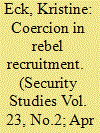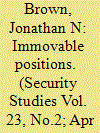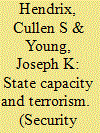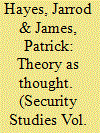|
|
|
Sort Order |
|
|
|
Items / Page
|
|
|
|
|
|
|
| Srl | Item |
| 1 |
ID:
132395


|
|
|
|
|
| Publication |
2014.
|
| Summary/Abstract |
Previous research on rebel recruitment has focused on the economic and social incentives groups used as enticements but has overlooked the question of why many armed groups recruit using coercion. The puzzle is why coercion occurs despite its alienating civilian populations and being costly in terms of organizational and military effectiveness. I suggest that recruitment is a dynamic process and that groups are likely to shift recruitment strategies depending on the exigencies of the conflict. In particular, the exposure of the group to military and economic shocks accompanied by shortened time horizons should lead to increasingly coercive recruitment. Whether forced recruitment is a durable solution for a group in the long run is likely to be contingent upon the group's ability to induce a high level of compliance from the individual at a low cost. Further, in order to circumvent costs vis-à-vis the civilian population, the group must be able to restrict defection to the government and the out-migration of the civilian population. Three narratives from Nepal, Ethiopia, and Sierra Leone are provided both to illustrate the arguments and to probe the scope conditions. The article concludes that understanding why and when rebel groups use forced recruitment has vital security implications for the countries in which armed conflict takes place.
|
|
|
|
|
|
|
|
|
|
|
|
|
|
|
|
| 2 |
ID:
132391


|
|
|
|
|
| Publication |
2014.
|
| Summary/Abstract |
Why might public acknowledgment of cooperative security negotiations generate bargaining constraints that provoke stalemate? Previous scholarship points to aroused public opinion. Yet in many cases where hard-line bargaining stances develop and talks collapse following public acknowledgment, it is not domestic political pressures that tie leaders' hands. This article examines instead an international constraint attendant to publicity: opposition by third-party states. I argue that international power position shapes the balance of vulnerability between the negotiating parties to abandonment and entanglement. The act of official acknowledgment can constrain the more vulnerable partner by enabling third-party states to credibly scrutinize its intentions. By threatening strained relations, such scrutiny can create a security dilemma that reduces the weaker partner's bargaining range to a choice between cooperation on its terms and noncooperation. I evaluate this argument by studying foreign military basing negotiations. Statistical analyses and a comparative case study produce strong support for my argument.
|
|
|
|
|
|
|
|
|
|
|
|
|
|
|
|
| 3 |
ID:
132390


|
|
|
|
|
| Publication |
2014.
|
| Summary/Abstract |
The ongoing reallocation of wealth and power from the West to the "rising rest" promises to produce a new pecking order over the course of the next few decades. Although there is a well-developed body of knowledge on the material dimensions of power transitions, existing scholarship provides a much more embryonic intellectual foundation on the normative dimensions of international change. Transitions in the international distribution of power produce not only novel hierarchies, but also novel brands of international order that rest on the social and ideological proclivities of newly powerful states in the system. This article explores the normative dimensions of hegemony by examining the geopolitical, socioeconomic, cultural, and commercial logics that inform different orders. The normative foundations of hegemony are studied across four great powers: the Ottoman Empire, Imperial China, Great Britain, and the United States. The cases reveal that as great powers rise, they as a matter of course seek to push outward to their expanding spheres of influence the norms that provide order within their own polities. Accordingly, today's emerging powers will not embrace the existing international order erected during the West's watch. On the contrary, China and other rising powers will seek to fashion alternative orders based on their own cultural, ideological, and socioeconomic trajectories. If the next international system is to be characterized by a rules-based order rather than competitive anarchy, it will require a new normative consensus that rests on toleration of ideological and political diversity.
|
|
|
|
|
|
|
|
|
|
|
|
|
|
|
|
| 4 |
ID:
008607


|
|
|
|
|
| Publication |
Summer 1995.
|
| Description |
695-810
|
|
|
|
|
|
|
|
|
|
|
|
|
|
|
|
| 5 |
ID:
132394


|
|
|
|
|
| Publication |
2014.
|
| Summary/Abstract |
Conventional wisdom suggests that dissident groups use terrorism when they face an overwhelmingly more powerful state, yet attacks in developing countries have predominated in the post-Cold War era, suggesting that terrorism is an increasingly weak state phenomenon. Cross-national studies of terrorism find mixed results for how common measures of state capacity influence terrorism. We argue that these indeterminate findings are due in part to a partial understanding of both what constitutes state capacity and how different aspects of state strength or weakness relate to the propensity of groups to use terrorism. We decompose state capacity into two dimensions that we theorize are particularly relevant to dissident groups: military capacity, or the ability to project conventional military force, and bureaucratic/administrative capacity. Our analysis supports the claim that terrorist attacks are more frequently targeted at states with large, technologically sophisticated militaries but less frequently targeted at states with higher bureaucratic and administrative capacity. We also compare two militarily capable states, France and Russia, that have had different recent experiences with terrorism to help illustrate the causal mechanisms involved. Evidence from our models and cases suggest that states can be capable in different ways, and these various capabilities create differing incentives for using terror as a strategic and tactical tool.
|
|
|
|
|
|
|
|
|
|
|
|
|
|
|
|
| 6 |
ID:
132396


|
|
|
|
|
| Publication |
2014.
|
| Summary/Abstract |
Inspired by Rudra Sil and Peter Katzenstein's call for analytic eclecticism and making use of newly available, previously classified archival documents, we distill the essential logics of realism, neoliberal institutionalism, and constructivism and examine their role in shaping the debates amongst British policymakers in the context of German unification in 1989-90. We find that, although all the theoretical logics help shape the policymaking surrounding unification, none stands alone as a basis for understanding social reality. Indeed, all functioned together as British policymakers thought in terms of theory to make sense of German unification. The logic of realism clearly played an important role in shaping the perceptions of top British leadership, particularly Margaret Thatcher, of German unification as a problem. But realism did not determine the solution to the "problem." Instead, British policymakers drew on the logic embedded in neoliberal institutionalism, turning to institutions to manage the unification process. The reason for this can be found in the role of constructivist logics-particularly identity and rhetorical entrapment-that constrained British policymakers to cooperative policy options. By taking this approach, this article makes several important contributions. First, it sheds light on British policy during a critical historical moment. Second, it significantly improves understanding regarding Germany's historical and current place in Europe. Third, it ties major theoretical traditions together through a foreign policy analytical approach, and in the process suggests that many of the theoretical boundaries separating scholars are overdrawn. Finally, the article pushes international relations scholars to keep in mind the complex relationship between reality and theory. In the final analysis, bringing to bear these three perspectives highlights the complexity of the processes that produced British policy-and by extension those that shaped German unification-as well as the importance of breaking free of the strictures of the ideas versus materiality debate.
|
|
|
|
|
|
|
|
|
|
|
|
|
|
|
|
| 7 |
ID:
132393


|
|
|
|
|
| Publication |
2014.
|
| Summary/Abstract |
Policymakers and scholars fear that the Internet has increased the ability of transnational terrorists, like al Qaeda, to attack targets in the West, even in the face of increased policing and military efforts. Although access to the Internet has increased across the globe, there has been no corresponding increase in completed transnational terrorist attacks. This analysis examines the causal logics-which have led to the conventional wisdom-and demonstrates both theoretically and empirically that the Internet is not a force multiplier for transnational terrorist organizations. Far from being at a disadvantage on the Internet, state security organs actually gain at least as much utility from the Internet as terrorist groups do, meaning that at worst the Internet leaves the state in the same position vis-à-vis terrorist campaigns as it was prior to the Internet.
|
|
|
|
|
|
|
|
|
|
|
|
|
|
|
|
|
|
|
|
|